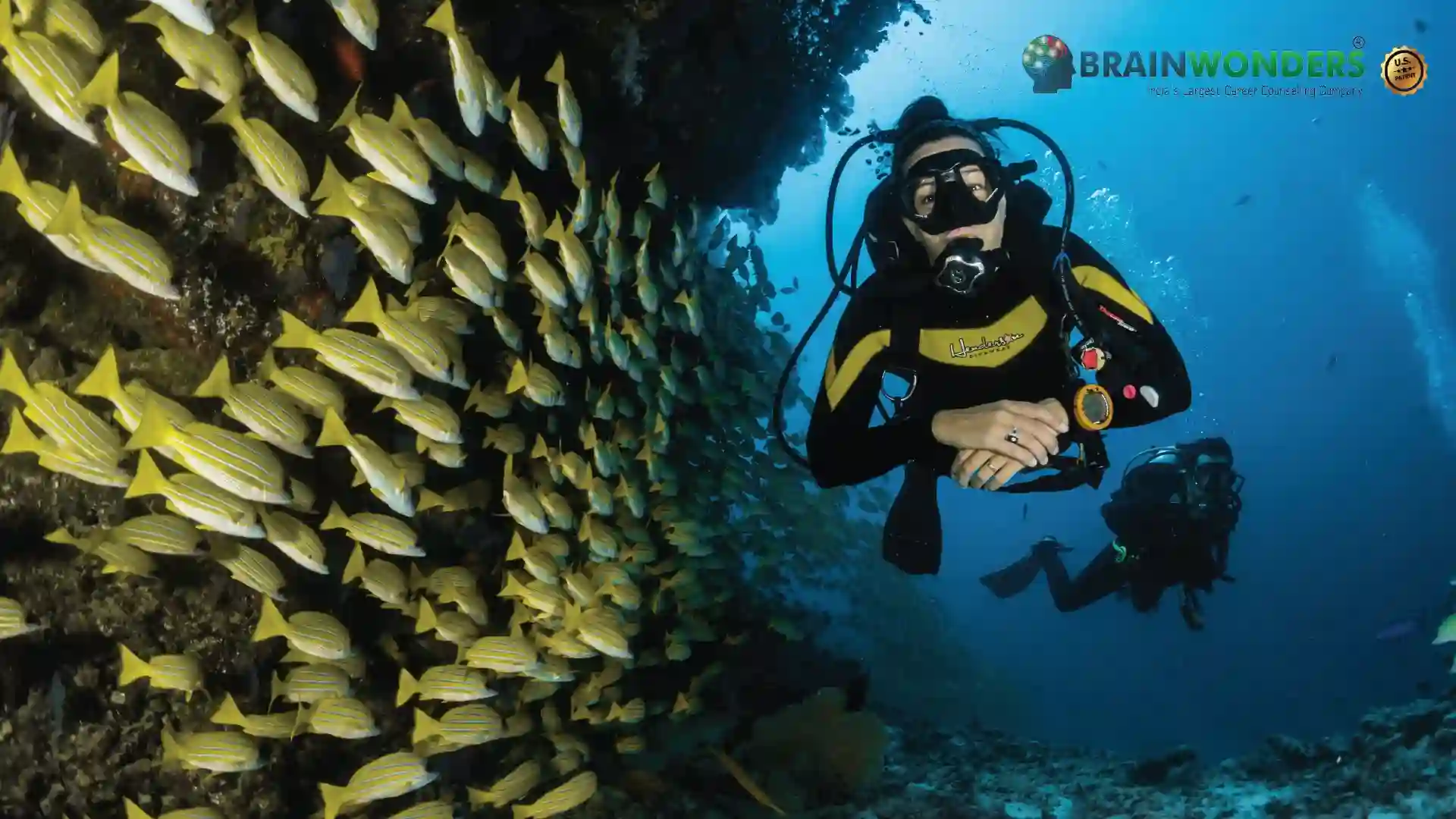How to become an Oceanographer
Overview, Courses, Exam, Colleges, Pathways, Salary

Overview
Who is Oceanographer ?
Environmental changes have been the discussions for a while now. The effect of human activities on nature has been a hot topic. Marine life and health is at stake, the normal functioning of the world greatly depends on the ocean health. Oceanographers study the important processes of the ocean and work towards mitigating the effect of climate change, overpopulation and overfishing. They study about life in the ocean, their ecosystems, ocean floor, waves and tides etc. Depending on the area of study there are 4 primary specialties in oceanography; Marine Biologist who are involved with the study of marine ecosystems and their inhabitants, Physical Oceanographers which involves the study of movement of the oceans such as waves, tides etc., Chemical Oceanographers monitor the chemical composition of the ocean water whereas Geological Oceanographers focus on the ocean floor, the undersea volcanic activity and tectonic plate movement etc.
Typical day at work
What does Oceanographer do?
- To conduct field studies and visit locations to collect samples and conduct surveys and to test the samples
- To evaluate the seawater components, pollutants and their impact on marine organisms.
- To study the physical conditions and mechanisms of the ocean such as wave currents, water movements around the world, coastal erosion etc.
- To examine the relationship between the climate and weather of the world and the deep currents of the ocean and its atmosphere.
- To prepare reports on the findings and present them to the clients, colleagues and to other concerned parties.
- To measure the concentration of salt and gas in the ocean water as well as the temperature, and to use the satellite information for data collection regarding the wave height and patterning, wind speed etc.
- To utilise computer software and sampling devices to measure details regarding marine life such as population and activities.
- To assist in oceanographic instrumentation design, production, detailing and documentation.
- To engage in marketing and communications with the external stakeholders
- To complete projects within budget and schedule the strings
Abilities and Aptitude needed
What are the skills, abilities & aptitude needed to become Oceanographer?
Here are the abilities, skills, and aptitudes needed to pursue a career as an oceanographer:
- Educational Background: A strong educational foundation is essential. Most oceanographers have a bachelor's degree in oceanography, marine science, marine biology, geology, physics, chemistry, or a related field. Many positions, especially research-focused ones, may require a master's or Ph.D. degree.
- Scientific Curiosity: An inherent curiosity about the ocean and a passion for understanding its mysteries are crucial. Oceanographers are driven by a desire to explore and unravel the complexities of marine ecosystems and processes.
- Analytical Thinking: Oceanographers must analyze complex data sets, conduct experiments, and interpret results. Strong analytical skills are essential for understanding oceanic phenomena and drawing meaningful conclusions from research.
- Math and Computer Skills: Oceanographers often work with large datasets and use computer models to simulate oceanic processes. Proficiency in mathematics and programming languages like MATLAB, Python, or R is important for data analysis and modeling.
- Fieldwork Abilities: Many oceanographers conduct fieldwork on research vessels or in coastal areas. Fieldwork requires practical skills such as operating equipment, collecting samples, and managing logistics in a dynamic and challenging marine environment.
- Laboratory Skills: Oceanographers need to conduct various laboratory experiments to analyze samples of seawater, sediments, marine life, and other materials. Proficiency in laboratory techniques, equipment operation, and safety protocols is essential.
- Communication Skills: Effective communication is crucial for presenting research findings, collaborating with colleagues, and writing scientific papers. Clear writing and presentation skills are necessary to communicate complex ideas to scientific and non-scientific audiences.
- Interdisciplinary Knowledge: Oceanography encompasses multiple disciplines, so having a well-rounded understanding of biology, chemistry, geology, physics, and environmental science is important for comprehending the interconnected nature of oceanic systems.
- Adaptability: Oceanographers often work in challenging and unpredictable environments. Adaptability and the ability to work under changing conditions in the field and lab are important traits.
- Problem-Solving Skills: Oceanographers frequently encounter unique challenges while studying the ocean. Strong problem-solving skills are essential for devising innovative methods to address research questions and overcome obstacles.
- Attention to Detail: Precise data collection, accurate measurements, and thorough documentation are essential in oceanography. Attention to detail ensures that research findings are reliable and credible.
- Physical Fitness: Fieldwork and research cruises can be physically demanding. Physical fitness is important for sample collection, maintenance, and working aboard research vessels.
- Teamwork and Collaboration: Oceanography often involves teamwork and collaboration with researchers from diverse backgrounds. Working well within a team and contributing to group projects is crucial.
- Environmental Stewardship: A deep respect for the ocean and a commitment to its preservation are important qualities for an oceanographer, as understanding and advocating for sustainable ocean management is vital in the field.
Salary
Salary for Oceanographer?
Salary of An Oceanographer is as follows :
- Minimum Monthly Salary: Entry-level office machine operators can anticipate a monthly salary ranging from INR 10,000 to INR 20,000. These initial earnings are typical for recent entrants to the field who are commencing their roles in operating various office machines and equipment.
- Maximum Monthly Salary: Highly experienced and specialized office machine operators possessing advanced skills and substantial years of practice in handling complex office machinery have the potential to earn in the range of INR 30,000 to INR 50,000 or more per month. Operators engaged in large corporations, specialized printing firms, or those with expertise in managing advanced office technology may command higher remuneration.
- Annual Salary: For junior or entry-level office machine operators, the annual salary could span between INR 1,20,000 to INR 2,40,000. As operators amass experience and proficiency in operating diverse office machines and assuming supervisory roles, their annual income may elevate from around INR 2,40,000 to INR 4,80,000 or beyond.
- Highest Paying Jobs and Scope: Office machine operators specializing in advanced equipment such as digital printers, photocopiers, and specialized automated systems are positioned for more lucrative salary prospects. Those contributing to streamlined workflow management, collaborating with administrative teams, or upholding high-quality document production could attain augmented earnings. Office machine operators hold pivotal roles in maintaining seamless office operations, ensuring precise document processing, and supporting administrative functions. Given the technological progress in office equipment and the imperative for efficient document handling, adept office machine operators can expect promising career opportunities. Professionals excelling in equipment operation, adept troubleshooting, meticulous attention to detail, and effective communication will likely encounter substantial career progression and advancement within the sphere of office machine operation.
Pathways
How to become an Oceanographer?
Entrance Exam
Entrance Exam for Oceanographer ?
Courses
Which course I can pursue?
Best Colleges
Which are the best colleges to attend to become an Oceanographer?
Industries
Which Industries are open for Oceanographer?
Oceanographers can work in various industries that rely on their expertise in understanding and studying the ocean. Here are some industries where oceanographers can find employment:
- Academic and Research Institutions: Many oceanographers work in universities, research institutions, and marine laboratories, conducting research, teaching, and contributing to scientific advancements in oceanography.
- Government Agencies: Government organizations such as the National Oceanic and Atmospheric Administration (NOAA), the United States Geological Survey (USGS), and similar agencies in other countries employ oceanographers to study and manage ocean resources, monitor marine environments, and provide data for policy and decision-making.
- Environmental Consulting Firms: Oceanographers play a crucial role in assessing the potential environmental impact of coastal development projects, offshore energy production, and other activities that may affect marine ecosystems.
- Marine Conservation Organizations: NGOs and non-profit organizations focused on marine conservation, such as The Nature Conservancy and Oceana, employ oceanographers to study and advocate for protecting marine ecosystems and species.
- Energy and Oil Industry: Some oceanographers work in the energy sector, studying ocean currents, seafloor geology, and other factors relevant to offshore oil and gas exploration and renewable energy projects like offshore wind farms.
- Fisheries and Aquaculture: Oceanographers contribute to sustainable fisheries management by studying fish populations, marine habitats, and ecosystem dynamics, helping ensure the health and viability of fisheries.
- Marine Technology Companies: Oceanographers are employed by companies that develop and manufacture marine technology equipment, such as underwater vehicles, sensors, and remote sensing devices.
- Tourism and Recreation: Some oceanographers work in the tourism and recreation industry, providing educational programs, guiding marine tours, and contributing to public awareness about marine life and conservation.
- Media and Education: Oceanographers can work in media outlets, science communication, and educational institutions, sharing their knowledge and research findings with the public through documentaries, articles, and educational programs.
- Climate and Environmental Research: Oceanographers play a key role in studying the impacts of climate change on the oceans, including sea-level rise, ocean acidification, and changes in ocean circulation patterns.
- Naval and Defense Organizations: Oceanographers may work with naval and defense organizations, providing expertise in underwater acoustics, sonar technology, and underwater warfare strategies.
- Meteorological and Atmospheric Research: Oceanographers collaborate with meteorologists to study the interactions between the oceans and the atmosphere, including the influence of ocean temperature on weather patterns.
- International Organizations: International bodies such as the United Nations and its specialized agencies may hire oceanographers to contribute to global ocean conservation, sustainable development, and policy-making efforts.
internship
Are there internships available for Oceanographer?
Internship opportunities for aspiring oceanographers can provide valuable hands-on experience and insights into the field. Here are some types of internships that may be available:
- Research Institutions and Universities: Many universities and research institutions offer summer internships or research assistant positions in oceanography labs. These internships can involve assisting with ongoing research projects, collecting and analyzing data, and participating in fieldwork.
- Government Agencies: Government agencies such as the National Oceanic and Atmospheric Administration (NOAA) and the United States Geological Survey (USGS) often offer internships in various areas of oceanography, including marine biology, marine geology, and ocean monitoring.
- Marine Conservation Organizations: NGOs and conservation organizations like The Ocean Conservancy or Oceana may provide internships focused on marine conservation, policy advocacy, and public outreach.
- Aquariums and Science Centers: Many aquariums and science centers offer internships that provide hands-on experience in educating the public about marine ecosystems, conducting outreach programs, and caring for marine animals.
- Environmental Consulting Firms: Some consulting firms specializing in environmental assessments and impact studies hire interns to assist with coastal development, marine resource management, and environmental monitoring projects.
- Oil and Gas Industry: While controversial due to environmental concerns, some companies in the oil and gas industry offer internships related to offshore exploration and environmental impact assessment.
- Marine Technology Companies: Internships with companies that develop marine technology, such as underwater robotics or remote sensing equipment, can provide insights into the technological aspects of oceanography.
- Sustainable Fisheries and Aquaculture: Internships with organizations focused on sustainable fisheries management, or aquaculture practices may offer opportunities to work on projects related to marine resource conservation.
- Oceanographic Research Vessels: Some research vessels accept interns to participate in field expeditions, where interns can gain experience in data collection, equipment operation, and navigation.
- Non-profit Research Organizations: Non-profit organizations specializing in oceanographic research, conservation, and education may offer internships that allow participants to engage in various activities.
Career outlook
What does the future look like for Oceanographer?
The future for oceanographers holds promising opportunities and challenges. As climate change intensifies, the demand for experts in understanding and mitigating its impact on oceans will grow. Oceanographers will play a pivotal role in researching rising sea levels, ocean acidification, and their effects on marine ecosystems and coastal communities. Technological advancements like autonomous underwater vehicles and remote sensing will enhance data collection and exploration capabilities. Collaboration across disciplines will become increasingly important, fostering innovation in ocean science. However, the field will face funding constraints and geopolitical tensions over ocean resources. To thrive in this evolving landscape, future oceanographers must possess strong interdisciplinary skills, adaptability, and a passion for addressing pressing global issues related to ocean health and sustainability.







